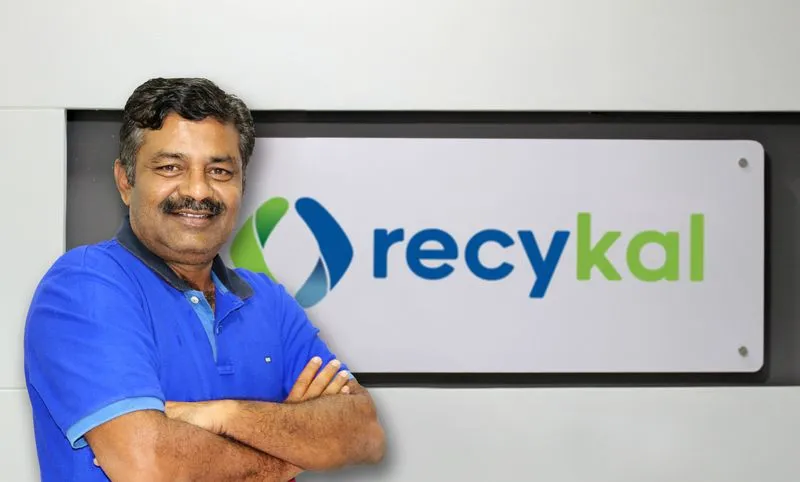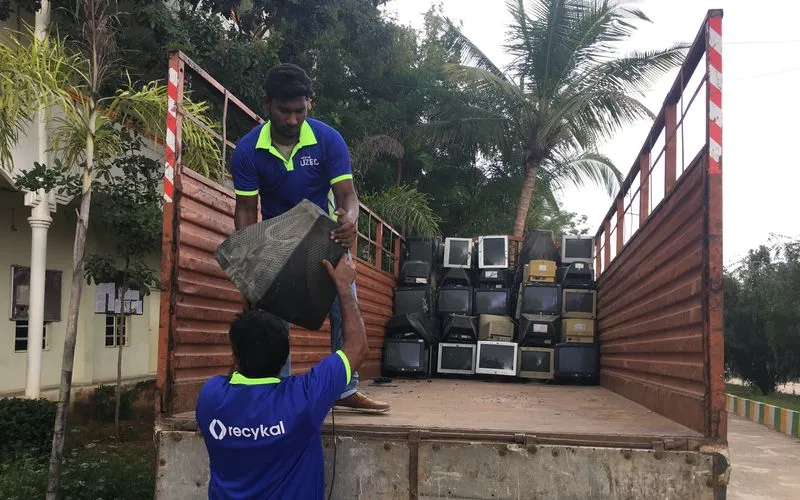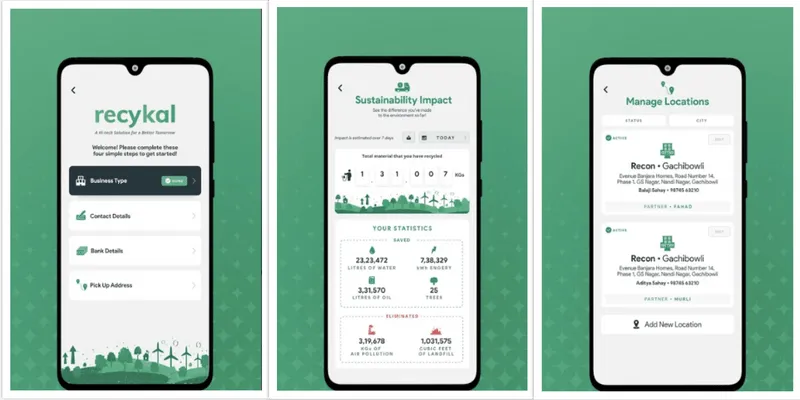This Hyderabad-based startup has built an Udaan-like marketplace for sustainable waste management
Recykal is organising the fragmented waste management sector with a cloud-based solution that improves real-time visibility for all stakeholders. The Hyderabad-based startup is chasing a $100-billion market opportunity.
Abhay Deshpande, a Hyderabad-based serial entrepreneur, sold his last venture to Capillary Technologies in 2015 in what was touted as one of the biggest SaaS deals in Southeast Asia.
MartJack, which he’d founded in 2007, was a SaaS platform for multi-channel ecommerce operators, with more than 250 enterprise clients such as Walmart, Unilever, Future Group, Aramex, Lulu, Fab India, and others.
In late-2016, Abhay turned his attention to another nascent sector that could potentially be disrupted with a cloud-based SaaS solution – waste management.
He founded Recykal, an end-to-end waste management platform that aggregated generators, collectors, ragpickers, kabadiwalas, processors, and recyclers.

Abhay Deshpande, Founder & Director, Recykal
The pain point it fixes
Recykal plans to organise the highly informal waste management sector, improve collection and disposal, reduce landfills, and enable sustainability practices.
Abhay tells YourStory,
“We wanted to build something impactful in the waste management space. Most operators here are either NGOs or corporates looking to fulfil their CSR objectives. Nobody was thinking digital when we started. Also, there was no concrete data available on the amount of waste generated or about sources that were generating it.”
Hence, a clear gap exists – one that Recykal is bridging digitally by connecting all stakeholders in the waste management chain.
“There is really no end to waste; more consumption leads to more generation and almost everyone is a waste generator,” says the founder.

The Recykal platform sees 10,000 metric tonnes of waste exchanging hands every month.
In early 2017, Abhay was joined by co-founders Abhishek Deshpande (a hospitality expert) and Anirudh Jalan (an investment banker and an angel investor) and the “the first line of code” for Recykal was written.
Since then, the Hyderabad startup claims to have formally collected, disposed of, and recycled several thousand tonnes of waste from individual households, commercial establishments, and even government bodies.
Waste typically includes plastic, paper, cardboard, e-waste (from electronic items), metal, glass, textile, etc., most of which is recyclable and reusable.
Recykal’s marketplace platform
Abhay calls Recykal a “pure marketplace like Udaan and Amazon”.
He elaborates,
“We connect bulk waste generators like FMCG companies, electronics manufacturers, IT and hospitality firms with recyclers whose livelihoods depend on the supply of waste. Through our platform, they can get that steady supply by simply logging in and buying the material instead of having to deal with hundreds of individual vendors, who are often unreliable.”
Large-scale waste generators, on the other hand, are able to dispose of stuff in a much more organised and sustainable manner. Recykal allows them to place on-demand pick-up requests, choose a recycler, and earn cost benefits of up to 15-20 percent.

Over 150 professional recyclers are using the Recykal platform.
The startup is able to provide cost benefits because digital eliminates four to five middlemen in the waste management chain, explains the founder.
Additionally, the SaaS product coffers Recykal’s enterprise clients “complete traceability” on the entire collection-to-recycling process.
“They can track the waste collected, the route through which it goes, the amount of water saved, and various other metrics. Real-time data is shared through a dashboard,” Abhay says.
Business model and customers
At present, Recykal is used by about 150 recyclers and more than 1,000 business enterprises. Its clients include Infosys, Aditya Birla Group, Accor Hotels, Westside, BigBasket, Maruti Suzuki, Honda, Spar Supermarkets, Banyan Nation, etc.
Each month, the platform witnesses more than 10,000 metric tonnes of recyclable waste changing hands across 20 Indian states in India. Recykal expects that figure to reach 100,000 metric tonnes a month in two to three years.

Hyderabad-based Recykal has 75 employees.
On the revenue front, the company is projecting an ARR of $5 million by April 2020. “We’re seeing a 30 percent month-on-month growth in topline,” Abhay states.
Recykal's revenue model is two-pronged: it earns a marketplace commission on each transaction between waste generators and recyclers, and also charges a SaaS fee from its enterprise customers.
Additionally, the startup has also partnered with about 50 companies to help them execute their take-back programmes and comply with the Extended Producer Responsibility (EPR) rules outlined by the Indian government.
Industry landscape and funding
Recykal asserts that it is India’s first cloud-based waste management solution, chasing a market that is worth nearly $100 billion.
“That is the size of the domestic market alone,” says the founder.
He adds,
“More than 1.5 percent of India’s population works in this space, and the circular economy is expected to create two million jobs by 2025."
Hence, there is considerable progress to be made in the recycling industry.
In June, Recykal raised a Pre-Series A round of $2 million from Triton Investment Advisors and the family office of Pidilite Industries.

At the time of funding, Dev Raman, Partner at Triton, said,
“Waste management and recycling is a massive and untapped space, where the stakeholders are often disjointed and disconnected. We see a multibillion-dollar industry evolving, and Recykal is leading the way in bridging technological and operational gaps.”
But given the predominance of informal transactions in the space, getting stakeholders to adopt a digital is often a challenge.
“Waste management has always been a completely cash-driven sector. Changing that to a formal ecosystem is a challenge,” says Abhay.
But change might be nigh!
“Thanks to Jio, the Indian consumer has gone through a behavioural change. And, that is helping all industries,” the founder signs off.
(Edited by Saheli Sen Gupta)











